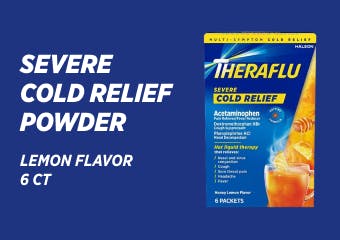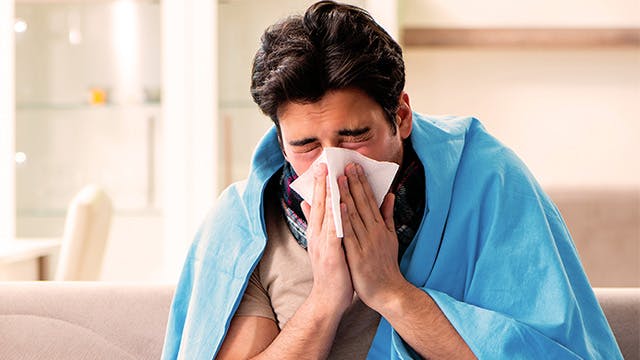Treating Flu Symptoms
Follow these tips for treating flu symptoms while you wait to recover.
- Stay home3
The number one thing you should do if you have the flu is stay home, and avoid contacting other people (unless you’re seeking medical care) to avoid spreading the virus and getting more people sick. If you’ve ever worked in an office environment or at a school, it’s possible you’ve experienced how illness travels around. Help prevent that by staying home.
If you are part of a high-risk group—like people over 65, pregnant women, or those whose immune system is compromised—be sure to contact your healthcare provider. - Drink lots of fluids4
It’s important to drink liquids like water, juice, and warm soup to help prevent dehydration. Whether you’ve got some sports drinks or your mom’s special chicken noodle soup recipe, staying hydrated can help replenish the fluids you lose when you sweat.
You might also find that drinking warm soup or teas may soothe a sore throat. Consider Theraflu® Multi-Symptom Severe Cold Hot Liquid Powder to relieve headache and sinus congestion. - Rest
Some of us don’t need an excuse to sleep more, while others need some serious incentive to hit the hay. But sleep will help your immune system fight off the virus. You may find that you need to sleep more than usual or decrease your activity levels even more, depending on how severe your symptoms are. - Try pain relievers
Over-the-counter treatments that contain the pain reliever acetaminophen can help with headache and body aches. Acetaminophen is also a fever reducer, so you’ll feel temporarily relief from that too.
If you have to care for someone who’s sick, you’ll want to use the above recommendations to help them recover. But take some additional precautions when helping someone with the flu, including:5
- Wash your hands often and before or after taking care of someone who is sick.
- Use an alcohol-based hand rub/hand sanitizer if you can’t get to soap and water right away.
- Avoid face-to-face contact with the person.
- If you are holding a sick child, gently place their chin on your shoulder so they cough away from your face.





